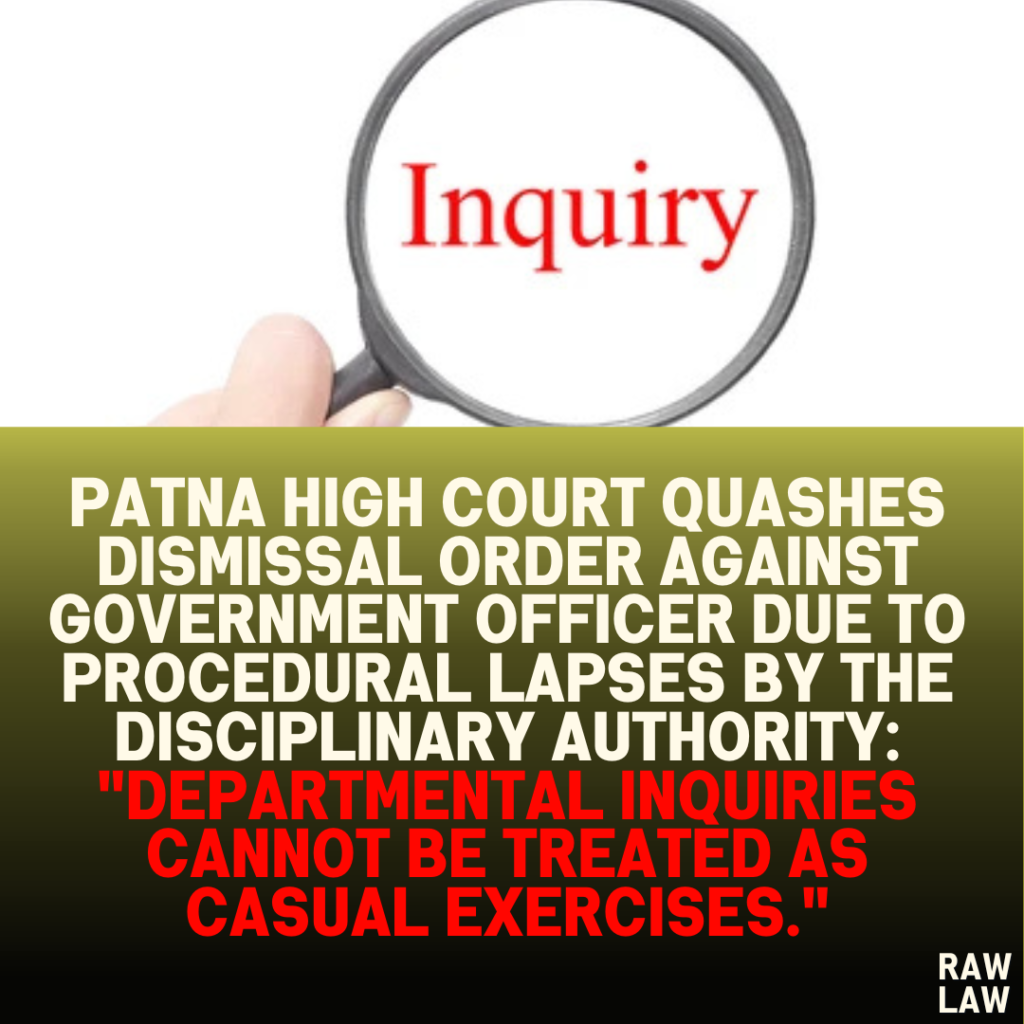Court’s Decision:
The Patna High Court quashed the dismissal order against the petitioner, a government officer, on the grounds of procedural lapses by the Disciplinary Authority. The court observed that the inquiry had not been conducted in accordance with the principles of natural justice, and the petitioner was not provided with necessary documents to defend himself. The court emphasized that “departmental inquiries must be conducted diligently and in accordance with the law.” The Chief Secretary of the Government of Bihar was directed to take corrective measures, including training Disciplinary Authorities to ensure compliance with statutory procedures in future proceedings.
Facts:
The petitioner was a government employee serving as a Block Education Officer when he was placed under suspension in 2007 after being arrested on charges of corruption. He was accused of demanding a bribe of ₹23,000 for allocating a school to a candidate who had been appointed on a compassionate basis. Despite being released on bail and the suspension being revoked, he was later dismissed from service in 2016 based on an inquiry that concluded his guilt.
The petitioner contested the dismissal order on the grounds that he was not provided with relevant documents during the inquiry and that no witnesses were examined, thereby violating principles of natural justice. He appealed against the dismissal, which was rejected by the Principal Secretary in 2018, leading to the filing of the present writ petition.
Issues:
- Whether the disciplinary inquiry against the petitioner was conducted in accordance with the principles of natural justice.
- Whether the Disciplinary Authority’s order of dismissal was legally sustainable given the procedural lapses in the inquiry.
- Whether the non-examination of key witnesses and failure to provide requested documents vitiated the disciplinary proceedings.
Petitioner’s Arguments:
- The petitioner argued that he was not provided with the necessary documents by the Inquiry Officer, which prevented him from effectively defending himself.
- The petitioner contended that neither the complainant nor any person from the Vigilance Department was examined during the inquiry proceedings.
- He relied on the Supreme Court judgments in Roop Singh Negi v. Punjab National Bank & Ors. and State of Uttar Pradesh v. Saroj Kumar Sinha to argue that a departmental inquiry should be conducted in a fair and just manner, with adherence to principles of natural justice.
Respondent’s Arguments:
- The respondents argued that the petitioner was caught red-handed while accepting a bribe, and the charges against him were serious in nature.
- They submitted that the inquiry was conducted as per the rules, and the findings of guilt were based on the evidence collected, including the complaint and documents.
- It was contended that the petitioner’s suspension was justified, and there were no procedural lapses warranting interference by the court.
Analysis of the Law:
The court analyzed the requirements for conducting a fair departmental inquiry under the Bihar Government Servants (Classification, Control & Appeal) Rules, 2005. It highlighted that the Disciplinary Authority is bound to ensure that a delinquent officer is given a reasonable opportunity to defend himself, which includes providing necessary documents and examining relevant witnesses. The court reiterated the principles laid down in Roop Singh Negi and Saroj Kumar Sinha cases, emphasizing that an inquiry must be unbiased and thorough.
Precedent Analysis:
The court referred to the case of Pankaj Kumar v. State of Bihar, where it was observed that the Disciplinary Authority’s ignorance of mandatory procedures leads to a mockery of departmental inquiries. The court also relied on Roop Singh Negi v. Punjab National Bank and State of Uttar Pradesh v. Saroj Kumar Sinha to emphasize the importance of adhering to principles of natural justice in departmental proceedings.
Court’s Reasoning:
The court found that the inquiry proceedings were flawed as the petitioner was not provided with necessary documents, and no witnesses were examined to substantiate the charges. The Inquiry Officer’s conclusion was based solely on the complaint and documents, which did not constitute sufficient evidence. The court noted that such lapses undermine the integrity of the disciplinary process and result in unjust outcomes. Thus, the dismissal order was found to be unsustainable in law.
Conclusion:
The Patna High Court quashed the dismissal order and allowed the writ petition. The court emphasized the need for strict adherence to statutory procedures in departmental inquiries and directed the Chief Secretary, Government of Bihar, to implement corrective measures, including conducting workshops and training sessions for Disciplinary Authorities.
Implications:
This judgment serves as a stern reminder to government authorities to ensure that departmental inquiries are conducted with due diligence and adherence to the principles of natural justice. It highlights the court’s unwillingness to tolerate procedural lapses that could result in wrongful punishments of public servants. The decision underscores the need for proper training of Disciplinary Authorities to prevent similar issues in the future.




Pingback: Patna High Court Modifies Order to Grant Arrears of Salary for 3 Years Due to Delay and Laches – "Equity Favors the Vigilant, Not the Indolent Litigant" - Raw Law
Undeniably imagine that which you stated. Your favorite reason seemed to be on the web the simplest
factor to be aware of. I say to you, I definitely get irked even as people consider worries that
they plainly don’t recognize about. You managed to hit the nail upon the top and outlined
out the whole thing with no need side effect , other people can take a signal.
Will probably be again to get more. Thanks